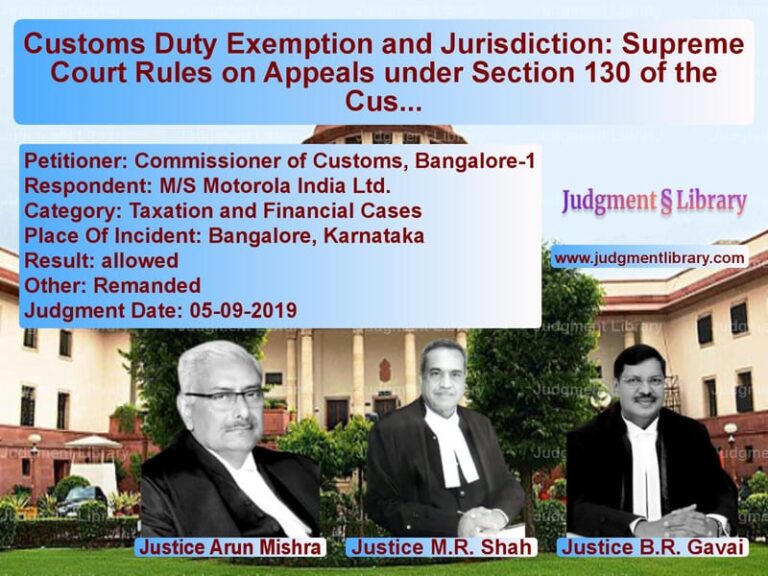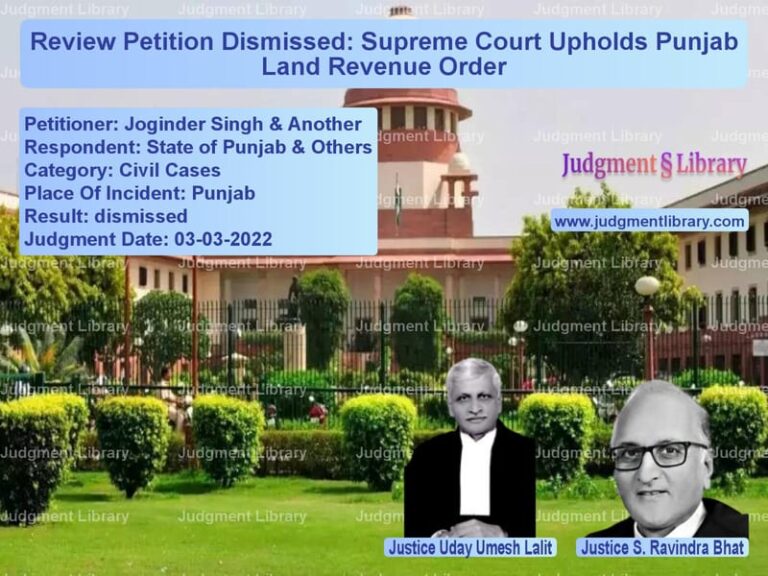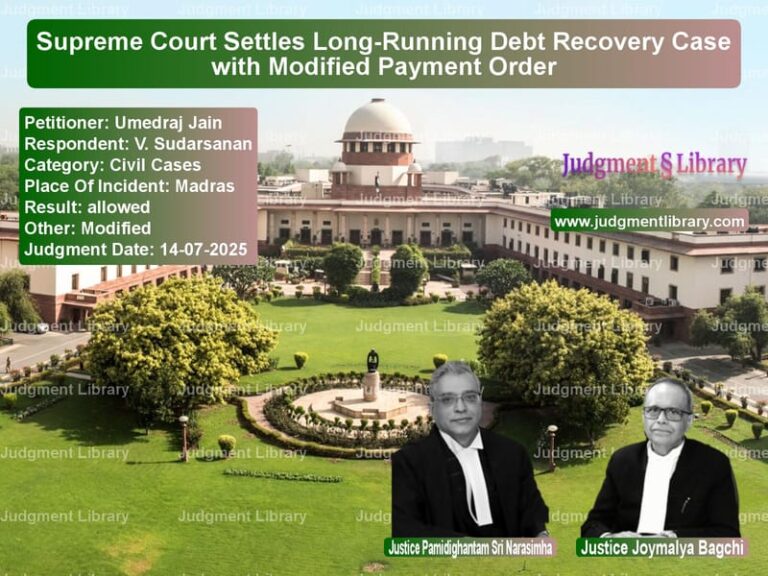Excise Duty Dispute: Supreme Court Clarifies Valuation Rules in CERA Boards Case
The case of The Commissioner of Central Excise, Customs and Service Tax, Calicut vs. M/S. CERA Boards and Doors, Kannur & Others involved a significant legal battle over excise duty valuation. The Supreme Court was tasked with deciding the proper method for determining the assessable value of excisable goods and whether the tribunal erred in directing a fresh adjudication.
Background of the Case
The case arose after the Directorate General of Central Excise Intelligence (DGCEI) conducted searches at the factory premises of CERA Boards and Doors in Kannur, Kerala, and its depot in Bangalore. The department alleged that the company was undervaluing its goods to evade excise duty.
Key developments:
- Searches were conducted on 17.10.2002, and various documents were seized.
- The department issued a show cause notice demanding Rs. 4,29,01,384 in excise duty for the period from 01.12.1998 to 05.12.2002.
- CERA Boards voluntarily paid Rs. 12,50,000 after the searches.
- The Commissioner of Central Excise, Calicut, after adjudication, confirmed a duty demand of Rs. 79,21,663, significantly lower than the original claim.
The Customs, Excise & Service Tax Appellate Tribunal (CESTAT) later set aside the Commissioner’s order and directed a fresh adjudication, leading to an appeal before the Supreme Court.
Arguments by the Petitioner (Commissioner of Central Excise, Customs & Service Tax, Calicut)
- The department argued that undervaluation was well established based on seized documents, dealer statements, and computer records.
- The Commissioner had already conducted a thorough adjudication and correctly determined the assessable value.
- The tribunal’s decision to order a fresh adjudication was unnecessary and would cause undue delay.
- The tribunal’s approach was inconsistent with earlier cases on excise valuation.
Arguments by the Respondent (CERA Boards and Doors)
- The company contended that the department wrongly applied a uniform undervaluation percentage to all transactions.
- The tribunal rightly found that the adjudication order failed to distinguish between pre-2000 and post-2000 transactions in light of the amended Section 4 of the Central Excise Act.
- The valuation method used by the Commissioner was arbitrary and ignored key transaction details.
Supreme Court’s Observations
The Supreme Court carefully examined the excise duty valuation rules and the impact of the amendments to Section 4 of the Central Excise Act, 1944. The Court noted:
- Before 01.07.2000, excise duty was based on the “normal price” of goods sold in the wholesale market.
- After 01.07.2000, the law shifted to “transaction value”, which considers the price actually paid or payable.
- Any additional consideration paid in cash or kind must be included in the transaction value.
- The valuation method must be determined based on whether the transactions occurred before or after 01.07.2000.
The Court observed:
“In cases where there is clear evidence of additional payments beyond the invoice value, the transaction value must be adjusted accordingly.”
Key Legal Findings
- The tribunal was justified in directing a fresh adjudication because the Commissioner’s order failed to distinguish between pre-2000 and post-2000 valuation rules.
- The valuation process must comply with the Central Excise Valuation (Determination of Price of Excisable Goods) Rules, 2000, wherever applicable.
- Undervaluation cannot be presumed across all transactions; specific evidence must support each instance.
- Where dealers paid amounts beyond the invoice price, the additional consideration must be included in the assessable value.
Final Judgment and Implications
The Supreme Court upheld the tribunal’s decision and directed a fresh adjudication, emphasizing:
“Since the adjudicating authorities failed to apply the correct valuation method in accordance with the law, a fresh adjudication is necessary to ensure justice.”
This ruling clarifies that excise duty valuation must adhere to the correct legal framework, ensuring transparency and fairness in tax assessments.
Petitioner Name: The Commissioner of Central Excise, Customs and Service Tax, Calicut.Respondent Name: M/S. CERA Boards and Doors, Kannur & Others.Judgment By: Justice S. A. Bobde, Justice A. S. Bopanna, Justice V. Ramasubramanian.Place Of Incident: Kannur, Kerala.Judgment Date: 19-08-2020.
Don’t miss out on the full details! Download the complete judgment in PDF format below and gain valuable insights instantly!
Download Judgment: The Commissioner of vs MS. CERA Boards and Supreme Court of India Judgment Dated 19-08-2020.pdf
Direct Downlaod Judgment: Direct downlaod this Judgment
See all petitions in Income Tax Disputes
See all petitions in Tax Evasion Cases
See all petitions in Banking Regulations
See all petitions in Judgment by S. A. Bobde
See all petitions in Judgment by A. S. Bopanna
See all petitions in Judgment by V. Ramasubramanian
See all petitions in dismissed
See all petitions in Remanded
See all petitions in supreme court of India judgments August 2020
See all petitions in 2020 judgments
See all posts in Taxation and Financial Cases Category
See all allowed petitions in Taxation and Financial Cases Category
See all Dismissed petitions in Taxation and Financial Cases Category
See all partially allowed petitions in Taxation and Financial Cases Category







